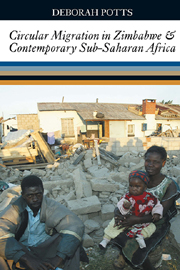Book contents
- Frontmatter
- Contents
- List of Maps, Figures, Tables, Boxes & Photographs
- List of Abbreviations
- Preface
- 1 Introduction
- 2 Regional Paradigms & Approaches to Circular Migration
- 3 Regional Paradigms & Approaches to Circular Migration
- 4 Harare & Zimbabwe
- 5 Migrant Livelihoods & Migration Trajectories in Harare
- 6 Harare Migrants' Rural Links & Assets
- 7 Variations in Migrants' Experience, Perceptions & Options
- 8 Social & CulturalAttachments to Rural Settings & Homes
- 9 Attacking the Urban Poor & Abusing Rural Links Operation Murambatsvina 2005
- 10 Conclusion
- Appendix: Consumer Price Index (all items) for Urban Families 1973–2007
- Bibliography
- Index
3 - Regional Paradigms & Approaches to Circular Migration
Southern Africa
Published online by Cambridge University Press: 05 July 2013
- Frontmatter
- Contents
- List of Maps, Figures, Tables, Boxes & Photographs
- List of Abbreviations
- Preface
- 1 Introduction
- 2 Regional Paradigms & Approaches to Circular Migration
- 3 Regional Paradigms & Approaches to Circular Migration
- 4 Harare & Zimbabwe
- 5 Migrant Livelihoods & Migration Trajectories in Harare
- 6 Harare Migrants' Rural Links & Assets
- 7 Variations in Migrants' Experience, Perceptions & Options
- 8 Social & CulturalAttachments to Rural Settings & Homes
- 9 Attacking the Urban Poor & Abusing Rural Links Operation Murambatsvina 2005
- 10 Conclusion
- Appendix: Consumer Price Index (all items) for Urban Families 1973–2007
- Bibliography
- Index
Summary
Introduction: The Dominance of Meta-narratives
Modernization & shattered expectations
Urbanization, then, seemed to be a teleological process, a movement towards a known end point that would be nothing less than a Western-style industrial modernity. An urbanizing Africa was a modernizing one….
(Ferguson, 1999: 5)… the story of urban Africa has for so long been narrated in terms of linear progressions and optimistic teleologies.
(Ferguson, 1999:13)A useful starting point for discussing the academic traditions of interpreting urbanization and migration in southern Africa is Ferguson's book, Expectations of Modernity: Myths and Meanings of Urban Life on the Zambian Copperbelt, from which the above two quotes are taken. This is because it not only provided a detailed explanation of how and why some of these academic traditions emerged, but also because it provided comprehensive evidence of how adherence to a model of modernization created an often exaggerated picture of transition to permanent migration during and in the early aftermath of the colonial period. One of Ferguson's primary purposes in the book was to examine the validity of ‘the dominant accounts of urban residence and worker mobility … [that] share an underlying metanarrative in which “migrant labor” is gradually replaced by “permanent urbanization”’ (ibid.: 40).
- Type
- Chapter
- Information
- Publisher: Boydell & BrewerPrint publication year: 2010



